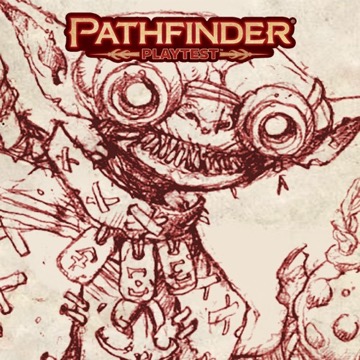Now that Stephen has explained Pathfinder Second Edition's skills and how they work, it's time to look at the goodies you can earn as you level up: skill feats! Every character gets at least 10 skill feats, one at every even-numbered level, though rogues get 20, and you can always take a skill feat instead of a general feat. At their most basic level, skill feats allow you to customize how you use skills in the game, from combat tricks to social exploits, from risk-averse failure prevention to high-risk heroism. If you'd ever rather just have more trained skills than special techniques with the skills you already have, you can always take the Skill Training skill feat to do just that. Otherwise, you're in for a ride full of options, depending on your proficiency rank.
Assurance and Other Shared Feats
Some skill feats are shared across multiple skills. One that will stand out to risk-averse players is Assurance, which allows you to achieve a result of 10, 15, 20, or even 30, depending on your proficiency rank, without rolling. Are you taking a huge penalty or being forced to roll multiple times and use the lowest result? Doesn't matter—with Assurance, you always get the listed result. It's perfect for when you want to be able to automatically succeed at certain tasks, and the kinds of things you can achieve with an automatic 30 are pretty significant, worthy of legendary proficiency.
The other shared skill feats tend to be shared between Arcana, Nature, Occultism, Religion, and sometimes Society and Lore. This is because many of them are based on magic, like Trick Magic Item (allowing you to use an item not meant for you, like a fighter using a wand) and Quick Identification, which lets you identify magic items faster depending on your proficiency rank, eventually requiring only 3 rounds of glancing at an item. The rest of the shared skill feats are based on the Recall Knowledge action, including my favorite, Dubious Knowledge, which gives you information even on a failed check—except some of it is accurate, and some of it is wrong!
Scaling Feats
You might have noticed that Assurance scales based on your proficiency rank in the skill. In fact, many skill feats do, granting truly outstanding results at legendary. For instance, let's look at the Cat Fall skill feat of Acrobatics:
CAT FALL FEAT 1
Prerequisites trained in Acrobatics
Your catlike aerial acrobatics allow you to cushion your fall. Treat all falls as if you fell 10 fewer feet. If you're an expert in Acrobatics, treat falls as 25 feet shorter. If you're a master in Acrobatics, treat them as 50 feet shorter. If you're legendary in Acrobatics, you always land on your feet and don't take damage, regardless of the distance of the fall.
As you can see above, Cat Fall lets you treat all falls as 10 feet shorter, 25 feet shorter if you're an expert, or 50 feet shorter if you're a master. If you're legendary? Yeah, you can fall an unlimited distance and land on your feet, taking no damage. Similarly, a legendary performer can fascinate an unlimited number of people with a Fascinating Performance, scaling up from one person at the start. And these are just a few of the scaling skill feats.
Wondrous Crafters
Want to make a magic item? Great, take Magical Crafting and you can make any magic item—doesn't matter which kind.
MAGICAL CRAFTING FEAT 2
Prerequisites expert in Crafting
You can use the Craft activity to create magic items in addition to mundane ones. Many magic items have special crafting requirements, such as access to certain spells, as listed in the item entry in Chapter 11.
Similarly, there's a skill feat to make alchemical items, and even one to create quick-to-build improvised traps called snares!
Legendary!
Legendary characters can do all sorts of impressive things with their skills, not just using scaling skill feats but also using inherently legendary skill feats. If you're legendary, you can swim like a fish, survive indefinitely in the void of space, steal a suit of full plate off a guard (see Legendary Thief below), constantly sneak everywhere at full speed while performing other tasks (Legendary Sneak, from Monday's blog), give a speech that stops a war in the middle of the battlefield, remove an affliction or permanent condition with a medical miracle (Legendary Medic, also from Monday's blog), speak to any creature with a language instantly through an instinctual pidgin language, completely change your appearance and costume in seconds (see Legendary Impersonator below), squeeze through a hole the size of your head at your full walking speed, decipher codes with only a skim, and more!
[[A]][[A]][[A]]LEGENDARY IMPERSONATOR FEAT 15
Prerequisites legendary in Deception, Quick Disguise
You set up a full disguise with which you can Impersonate someone with incredible speed.
LEGENDARY THIEF FEAT 15
Prerequisites legendary in Thievery, Pickpocket
Your ability to steal items defies belief. You can attempt to Steal an Object that is actively wielded or that would be extremely noticeable or time-consuming to remove (like worn shoes or armor). You must do so slowly and carefully, spending at least 1 minute and significantly longer for items that are normally time-consuming to remove (like armor). Throughout this duration you must have some means of staying hidden, whether under cover of darkness or in a bustling crowd, for example. You take a -5 penalty to your Thievery check. Even if you succeed, if the item is extremely prominent, like a suit of full plate armor, onlookers will quickly notice it's gone after you steal it.
So what sorts of feats are you most excited to perform with your skills? Let me know in the comments section!
Mark Seifter
Designer

